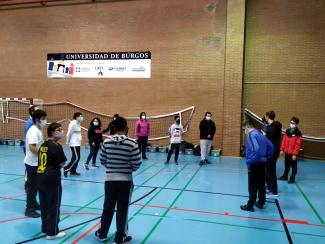A manifesto to claim the rights of people with disabilities

20/05/2021
The International Day of People with Disabilities is celebrated on 3 December.
On the occasion of the International Day of People with Disabilities, students with intellectual disabilities at the University of Burgos - through a project funded by ONCE, within the framework of the Operational Programme for Youth Employment 2014-2020, co-financed by the European Social Fund - drew up a manifesto to celebrate this event.
In this document, under the slogan "From the University to the world, the students of the "Expert course in competences for inclusion and independent living" led by professors Raquel de la Fuente Anuncibay and José Luis Cuesta state that "International days are days to remember and claim that things are not working well" and to claim and demand their rights. "The rights we are asking for are written in the laws and in the International Convention on the Rights of Persons with Disabilities", they point out.
During the academic year 2020/21, the Faculty of Education is carrying out the 4th edition of the project, through the Expert Course on Skills for Inclusion and Independent Living, in which 15 young people with intellectual disabilities are participating.
The people with intellectual disabilities trained at the UBU have taken advantage of this day to present their demands and, although they point out that all rights are very important, on this occasion, they have selected four essential rights: the right to equality and non-discrimination, education, privacy and work.
In the manifesto, they highlight their concern for the right to equality and non-discrimination, recalling that all people are equal before the law, that no one can discriminate against them because they are different and that things must be adapted so that they can have the same opportunities.
They need to understand the information and ask that we treat them well as adults, they want to learn, to have more culture, to be more independent and autonomous, to improve their self-esteem and to function better in society.
They also ask for education to be adapted to each person, they remember that they need special support and schools and training centres in safe places without bullying.
They also stress privacy in the right to their data and their lives, that they should not be spied on; and they defend privacy and their right to work in order to be able to live better, not to depend on anyone and to show what they can do. "People with intellectual disabilities have fewer opportunities to work, and for this reason, we ask for more support and adapted jobs".
"Claiming - they argue - means claiming our rights" and, finally, they claim that the rights they are asking for are written in the laws and in the International Convention on the Rights of People with Disabilities.

